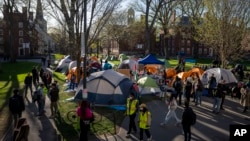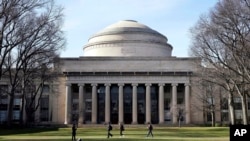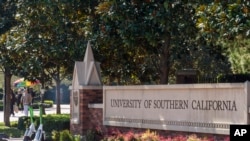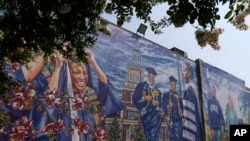Student Union
From Campus to Congress, Colleges Urged to End Legacy Boost

America's elite colleges are facing growing calls to end the decades-old tradition of giving an admissions boost to the children of alumni — a practice that critics say is rooted in racism and bestows an unfair advantage to students who need it least.
Fueled by the national reckoning with racial injustice, opponents say they are gaining momentum in the battle over the contentious policy of legacy preferences.
Ivy League students are pressing administrators to abandon the policy. Yale's student government took a stance against the practice in November. A recent vote of Harvard students found that 60% oppose it. Hundreds of students and alumni across 30 colleges have promised to withhold financial donations over the issue.
Civil rights groups are increasingly adding their support, including the American Civil Liberties Union, which is tackling legacy preferences as part of a campaign against systematic racism.
And a bill in Congress aims to eliminate the practice.
The proposal from Democrats would outlaw preferences for children of alumni or donors at colleges that receive federal money. It's being pushed by the party's progressive wing but has gained support from some conservative activists who want college admissions to be based on merit alone.
Legacy preferences give an extra boost to predominantly white and wealthy legacy students, while "leaving out millions of Black and brown kids," said Representative Jamaal Bowman, a Democrat from New York, a sponsor.
"There has been a shift in the consciousness of the country around issues of inequity and inequality," Bowman said in an interview. "There's a real yearning to right the wrongs of our past."
In the heavily guarded world of college admissions, it's hard to know exactly how many legacy students get a nudge. But at some of the most selective colleges, students with family ties make up 10% to 20% of the latest incoming class, according to data released by colleges in response to an Associated Press request.
On many campuses, the opposition is being led by students of color and those who are the first in their families to attend college. They say legacy status is one more advantage for students who are already more likely to have access to tutoring, test prep and other help applying to college.
Zoe Fuad, a junior at Brown University, said it reinforces a "cycle of inequity" that was designed to serve wealthy white men.
"By perpetually giving advantages to their descendants, we're ensuring that those who were systemically favored continue to be favored," said Fuad, 20, who leads a student group that's challenging the practice at Brown.
Many prestigious colleges defend legacy admissions, saying it helps build an alumni community and encourages donations. Officials at Harvard and other schools argue that legacy status is just one of many factors considered in admissions, along with grades, test scores and pursuits outside school. At most, they say, it can provide a slight tip in a student's favor.
Still, two colleges have ended the practice recently, giving opponents hope that others will follow.
Amherst College in Massachusetts dropped the policy in October, saying it "inadvertently limits educational opportunity." Johns Hopkins University announced in 2020 that it had phased out legacy preferences. Since then, the school has drawn growing numbers of Black and Hispanic students, along with those from low-income families.
The pushback against legacy preferences is advancing amid a broader debate over fairness in college admissions.
Last month the Supreme Court agreed to review whether colleges can consider applicants' race as a way to expand diversity. The court will take up lawsuits alleging that Harvard University and the University of North Carolina discriminate against Asian American applicants in favor of Black and Hispanic students.
In a rare moment of bipartisan unity, the conservative strategist behind those suits voiced support for the Democrats' bill against legacy benefits. In a statement, Edward Blum said too many colleges "lower the admissions bar for the children of their alumni."
Senator Jeff Merkley, a Democrat from Oregon, a sponsor of the bill, said it aims to level the playing field for minority students and those from working-class families.
"More and more of the good-paying jobs in America require a college education," he said. "It's important that ordinary students from regular backgrounds have a fair chance to go to these institutions."
Most schools are not required to disclose how many legacy students they enroll and many keep it private. Among the nation's 30 most selective colleges, only eight provided basic data on the subject in response to an AP request.
At those colleges, the share of legacy students in this year's freshman class averaged 12%. The lowest share was at Rice University in Houston, where 4% of this year's first-year class had legacy status. The University of Notre Dame said legacy students have averaged 23% of the student body over the past decade.
Legacy students outnumbered Black students in freshman classes at four schools: Notre Dame, Cornell, Dartmouth and the University of Southern California. At Brown, the share of legacy and Black students was about even.
Harvard refused to disclose details, but data made public during its trial over affirmative action showed that family ties carry outsize weight. From 2014 to 2019, the acceptance rate for legacy applicants was 34%, compared with 6% for applicants without legacy status, according to an analysis by the suit's plaintiffs.
Critics of the practice say it contributes to persistently low numbers of Black students at top colleges. During the racial reckoning following the killing of George Floyd by police, hundreds of students at Georgetown University signed a letter calling for an end to legacy preference, saying it "relegates qualified Black students to second-tier status."
Historians have traced legacy preference to the 1920s as elite colleges sought to limit the number of Jewish students. It continued for decades at a time when the majority of college students in the U.S. were white men.
At many schools with legacy preferences, Black students were not admitted until the 1960s, said Michael Dannenberg, a vice president at the Education Reform Now think tank.
"White applicants have between eight and 16 generations of ancestors on which to establish an alumni connection," said Dannenberg, who has opposed the practice since he was an aide to Sen. Ted Kennedy, the late Massachusetts Democrat, two decades ago. "For the vast majority of Black and Latino applicants, there's maybe one or two generations."
On college campuses, student activists say they continue to face resistance from school leaders who defend the policy. But at a time of rising populism in the United States, colleges are unlikely to find allies in Congress and other halls of power, said Richard Kahlenberg, a senior fellow at the Century Foundation, a progressive think tank in Washington.
Especially in the wake of the Varsity Blues admissions scandal, he said, it's becoming more difficult for colleges to defend policies that benefit the wealthy.
"They are clearly vulnerable on this issue," he said.
In the wake of that scandal, Colorado became the first state in the nation to outlaw legacy preferences at public colleges. California lawmakers required colleges to disclose how many legacy students get accepted.
Among campus activists, there's a driving desire to change the perception that top colleges are ivory towers reserved for the wealthy. When Viet Andy Nguyen applied to Brown University as a low-income, first-generation student, he knew he was competing against wealthier students with alumni connections. It made him question whether Brown was really a place for people like him.
After graduating from Brown in 2017, he launched the nonprofit EdMobilizer with the goal of expanding access to college and ending legacy preferences. He has orchestrated a donation boycott at schools across the U.S., and he's helping students fight the practice on scores of campuses.
It isn't lost on him that he's challenging a policy that could benefit his future children. He has faced resistance from some students of color who wonder why he wants to end it now, when campuses are more racially diverse than ever. But to him, the goal is to open doors for students who have been excluded, not to create "an elite lineage of people of color."
"My kids will be fine," he said. "They don't need an additional bump just for being my offspring."
See all News Updates of the Day
US remains top choice for Indian students going abroad

About 69% of Indian students traveling abroad for their studies chose the United States, according to a Oxford International’s Student Global Mobility Index. Other popular choices were the United Kingdom, Canada and Australia.
Education Times reports the main influencers for deciding where to study abroad – for Indian students and others – were parents. (April 2024)
Malaysian official: Schools can’t turn away from global tensions

Zambry Abdul Kadir, Malaysia’s higher education minister, said protests spreading across universities in the United States show that schools can’t ignore political tensions.
Helen Packer, reporting in Times Higher Education, said the minister reminded educators that universities are key in the development of leaders, individuals and societies. (April 2024)
Social media breaks are difficult, but necessary

Between online classes, maintaining social connections and working on projects, college students can have a hard time disengaging from the demands of technology.
In Florida International University’s PantherNOW, Ariana Rodriguez offers strategies for taking a break from social media. (April 2024)
- By Melos Ambaye
Many master's degrees aren't worth the investment, research shows

Nearly half of master's degrees have a negative financial return, according to new research by the Foundation for Research on Equal Opportunity, an economic research organization.
The study indicates that many graduate degree programs do not increase lifetime earnings enough to be worth it.
While 23% of bachelor’s degree programs yield a negative financial return on investment, 43% of two-year degrees and master’s degrees fail to deliver a return, according to the study by Preston Cooper, a senior fellow at FREOPP.
Cooper assessed the return on investment for 53,000 degree and certificate programs to determine whether a student’s lifetime earnings outweigh program costs and the risk of not completing their degree.
His findings show that a student’s field of study was the overriding indicator of return on investment at the undergraduate and graduate level.
Engineering, computer science and nursing bachelor’s degrees have high financial returns on investment, while programs in education, fine arts, psychology and English usually have low returns.
Graduate degrees in medicine and law tend to have strong payoffs. But a large share of master’s programs, including the MBA, frequently have low payoffs, according to Cooper.
Although workers with master’s degrees earn 16% more than those with only bachelor’s degrees, Cooper says the figure fails to account for students who had “higher preexisting earnings potential.”
“MBA students typically have high preexisting earnings potential, having often chosen high-ROI undergraduate majors such as finance and economics,” Cooper writes. “So the MBA adds little value on top of that.”
The study indicates that high starting salaries are predictors of high returns on investment. Degrees with starting salaries of $57,000 a year or more deliver the best lifetime returns.
But the return on investment of a degree can vary depending on the educational institution.
“Students interested in fields with low average pay can still find some schools that do well transforming those fields of study into high-paying careers,” Cooper writes.
The quality of an institution also matters, said William Tierney, professor emeritus of higher education at the University of Southern California.
“An MBA from Harvard is a likely ticket to a good job,” Tierney told VOA. “An MBA from the University of Phoenix, less so.”
But students pursue graduate programs for more than just financial reasons.
“Some degrees open up careers in fields that students may enjoy, such as in the performing arts,” Robert Kelchen, head of educational leadership at the University of Tennessee, Knoxville, told VOA.
“Others can help gain access to social networks or simply help students learn about a topic that is of interest,” Kelchen added.
Cooper told VOA that it might make sense for students in degree programs with low returns on investment to switch majors if they can still graduate on time.
He found the worst outcome for a student’s return on investment is dropping out of college “because they must pay for one or more years’ tuition and spend time out of the labor force.”
Lawmakers who fund higher education have a responsibility in ensuring “higher education delivers on its promise of economic mobility,” Cooper said.
Nearly a third of federal funding, including Pell grants and student loans, pays for higher education programs that fail to provide students with a return on investment, according to the study.
Cooper’s view is that “some schools should shut down low-ROI programs and reallocate institutional resources to programs with a better return.”
“There's definitely this narrative out there that higher education is always worth it, and you should always try to get that extra degree because it will increase your earnings,” he told VOA. “That's reinforced by colleges who make lofty promises regarding their graduate degree programs' outcomes, which all too often fall short.”
Harvard students end protest as school agrees to discuss Gaza conflict

Protesters against the war between Israel and Hamas were voluntarily taking down their tents in Harvard Yard on Tuesday after university officials agreed to discuss their questions about the endowment, bringing a peaceful end to the kinds of demonstrations that were broken up by police on other campuses.
The student protest group Harvard Out of Occupied Palestine said in a statement that the encampment "outlasted its utility with respect to our demands." Meanwhile, Harvard University interim President Alan Garber agreed to pursue a meeting between protesters and university officials regarding the students' questions.
Students at many college campuses this spring set up similar encampments, calling for their schools to cut ties with Israel and businesses that support it.
The Israel-Hamas war began when Hamas and other militants stormed into southern Israel on October 7, killing some 1,200 people and taking 250 hostages. Palestinian militants still hold about 100 captives, and Israel's military has killed more than 35,000 people in Gaza, according to Gaza's Health Ministry, which doesn't distinguish between civilians and combatants.
Harvard said its president and the dean of the Faculty of Arts and Sciences, Hopi Hoekstra, will meet with the protesters to discuss the conflict in the Middle East.
The protesters said they worked out an agreement to meet with university officials, including the Harvard Management Company, which oversees the world's largest academic endowment, valued at about $50 billion.
The protesters' statement said the students will set an agenda that includes discussions on disclosure, divestment, reinvestment and the creation of a Center for Palestine Studies. The students also said that Harvard has offered to retract suspensions of more than 20 students and student workers and back down on disciplinary measures faced by 60 more.
"Since its establishment three weeks ago, the encampment has both broadened and deepened Palestine solidarity organizing on campus," a spokesperson for the protesters said. "It has moved the needle on disclosure and divestment at Harvard."









